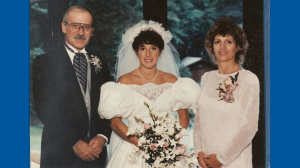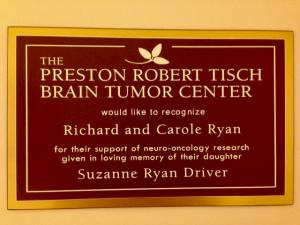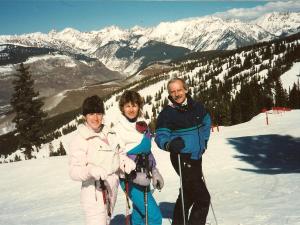A Mother’s Gift Honors Her Daughter and Fuels Brain Tumor Research at Duke
In the early morning of July 3, 1966, in Norristown, Pennsylvania, Carole Ryan could not believe she was in labor.
Her baby was due on the Fourth of July, and Carole felt strongly that she would give birth to her first child on Independence Day. But after some coaxing by her concerned husband, Carole grudgingly agreed to go to the hospital. Her acquiescence proved wise — baby Suzanne arrived just 20 minutes later at 6:10 a.m.
While not born on July 4, Suzanne Ryan Driver would become every bit the firecracker her mother anticipated. Called “Suz” by the friends and family she adored, Suzanne embraced life with zeal, kindness, and grit — an accomplished athlete always ready for the next challenge, a bright mind with a gift for crunching numbers, a passionate advocate who inspired those around her.
Carole and Richard Ryan experienced immeasurable joy through Suzanne, their only child, particularly when she became a wife and mother herself. And they endured untold grief when they lost their beloved daughter on Sept. 10, 2010, at age 44.
Today, through an endowment that bears her name, Suzanne’s legacy endures at Duke Health. The Suzanne Ryan Driver Brain Tumor Research Fund helps to advance groundbreaking research on high-grade gliomas — the type of brain tumor that took her life. Carole and Richard created the fund soon after Suzanne died, choosing to support research at Duke in gratitude for the place they credited with extending Suzanne’s life far beyond her initial prognosis.
“It was a combination of wanting to help people and realizing that we really wanted to make an impact,” Carole said.
When Richard passed away a year after Suzanne, Carole continued their philanthropic partnership with Duke on her own. For 15 years, she has been donating consistently. Now, she has made a generous planned gift of $2.5 million, creating lasting impact that will support innovative research, advanced technologies, and the next generation of health care leadership in brain tumor science.
In all, Carole and her late husband have contributed more than $4 million to brain tumor research at Duke through their daughter’s fund.
“We are incredibly grateful to Carole for her steadfast support of glioma research at Duke,” said David M. Ashley, MD, director of the Preston Robert Tisch Brain Tumor Center at Duke. “Her generosity honors Suzanne’s memory in the most meaningful way — by fueling the discoveries that lead to more effective and compassionate care for future patients and families.”
Duke’s Compassion Made the Difference
Suzanne spent her earliest years growing up on a lovely but isolated street in Chester County, Pennsylvania. She missed having playmates, so the Ryan family moved to a neighborhood bursting with children and activity. There she thrived, demonstrating a deep love for music and excelling at a variety of sports, including lacrosse, swimming, gymnastics, skiing, and tennis. A fierce competitor, she broke her nose once playing field hockey in high school.
Suzanne graduated from Syracuse University in New York and became a certified public accountant, then CEO of a visiting nurse agency in Pennsylvania. She delighted in motherhood when her first son was born in 1996, followed by another son in 2000.
“She had the perfect life,” Carole said.
But six weeks after the birth of her second child, Suzanne suffered a seizure, which led to the shocking discovery of a brain tumor. She underwent surgery in Philadelphia, followed by radiation, and began taking temozolomide to treat the cancer and help prevent additional seizures.
None of these interventions were a cure. Suzanne had terminal brain cancer.
“She was told she had five years,” Carole said.
Unsatisfied with her daughter’s prognosis, Carole, who worked as a public health nurse, began researching brain tumor centers across the country. She ran across an article about a man who had a rare blood disease and sought treatment at Duke. It was not a brain tumor, but the man’s story caught her eye.
“He talked about what a compassionate place Duke is, and I knew immediately that Duke was the kind of organization that I would want Suzanne to be involved with,” Carole said. “All the places we researched were excellent, but Duke was compassionate, and that made the difference for us.”
‘Team Super Mommy Suz’
Suzanne began treatment at Duke in 2001 with renowned physician-scientists at the Duke Cancer Institute, offering new approaches to treatment, cutting-edge medicines, and world-class comprehensive care. Initially, Suzanne and Carole flew from Pennsylvania to Durham every three months, then every six months. They would arrive for her MRI, have dinner at a favorite restaurant, and spend the night, then return for her oncology visit. They would be home in time for Suzanne to have dinner with her family the next day.
Suzanne was a model patient. She took her medications diligently and never missed an appointment or a scan.
“She was very happy and satisfied with her team. She had absolute faith in her treatment and her doctors at Duke,” Carole said. “She knew she was getting the best in care. She also knew she had a limited lifespan.”
Mother and daughter kept that routine for 10 years — twice the time Suzanne thought she would have after the seizure revealed the brain tumor.
“She was told five years, and she ended up with double that, a decade,” Carole said. “She had 10 years with her family. We were so grateful.”
Suzanne made the most of every day. Unable to work as a CPA after her diagnosis, she instead volunteered as treasurer for her church, St. Peter's Episcopal, for 10 years. She also volunteered at her sons’ preschool and elementary schools, and she became a devoted fundraiser for Race for Hope, an awareness campaign hosted by the National Brain Tumor Society to support research and advocacy for a cure for brain tumors.
For eight years, Suzanne rallied friends and family in Pennsylvania to raise money and walk in the annual 5K. Their team, dubbed “Team Super Mommy Suz,” ballooned to 35 people, raising $25,000 in one year alone.
“Philanthropy made her feel a lot better. She did not want this to happen to any other young women,” Carole said. “It gave her hope and empowered her to feel like she was doing something to help.”
Commitment to Advancing Science and Discovery
With her cancer largely controlled, Suzanne remained remarkably active during the decade she received treatment at Duke. An avid tennis player, she was competing in April 2010 at a club in Pennsylvania when she became unresponsive while sitting in a chair. An ambulance transported her to a local hospital, where doctors determined that she’d had a seizure. The family traveled to Durham and, as Carole suspected, the Duke team confirmed that Suzanne’s brain tumor had recurred.
Trips to Duke became much more frequent and medications increased, but Suzanne was not improving. In a final effort, she enrolled in a clinical trial at Duke to no avail. She passed away five months after the tennis match.
“She was an extremely brave person,” Carole said.
In another demonstration of the family’s commitment to advancing science and discovery, Suzanne donated her brain to Duke.
Since her daughter’s death, Carole has followed updates about brain tumor research at Duke. Brain tumors are one of the most aggressive and complex conditions in medicine, and Carole is amazed by the progress Duke researchers are making in translating new scientific understanding into lifesaving treatments. She is particularly inspired by a new therapy that more than doubles progression-free survival for patients with low-grade gliomas, as well as new insights into the origins of glioblastoma that may help identify and treat people at risk — years before they develop a tumor.
“My hopes have come to fruition at Duke,” Carole said. “You can imagine how this progress makes me feel. It is so wonderful that other young women face a less uncertain future because of research that’s being done at Duke.”
Carole now lives in Florida with her second husband, Ralph Bauer, who wholeheartedly supports her commitment to philanthropy. But for a few weeks in the summer, Carole and Ralph return to the cottage in New York that has been in the Ryan family for more than 100 years. Suzanne spent summers there with her cousins, who also keep coming back. They’ve decided to name it Suz’s Place.





